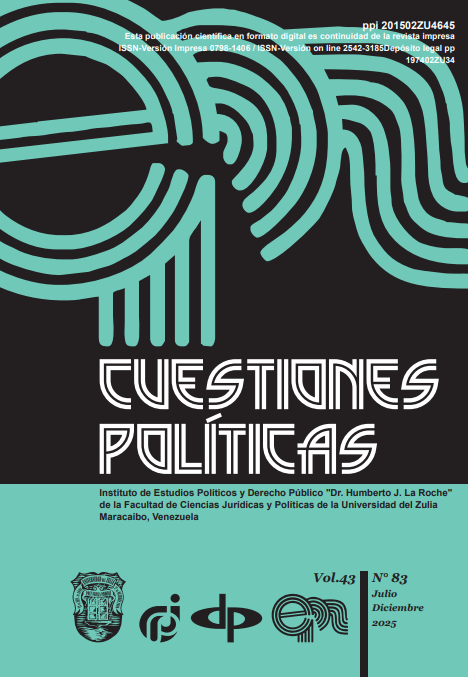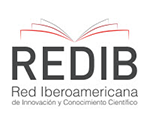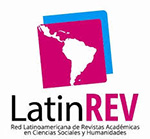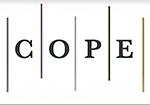Socialismo del siglo XXI. El Uróboro de la sociedad política democrática venezolana
Resumen
En los últimos veinte años, el sistema político venezolano surgido bajo la revolución bolivariana y el socialismo del siglo XXI ha generado crecientes dudas sobre la capacidad real del gobierno, desplazando la legitimidad democrática y subordinando el papel ciudadano a un nivel secundario dentro de la estructura de poder. Este ensayo tuvo por objetivo exponer cómo el modelo implementado constituye una “democracia uróboros”, en la que el sistema político, a través de determinaciones estrechas de la mayoría, refrenda decisiones fundamentales tomadas por una minoría, instaurando una dinámica circular y autorreferencial donde el poder termina legitimándose a sí mismo. En las conclusiones se argumenta que, la imagen del uróboros —la serpiente que se devora a sí misma— sirve como metáfora de una democracia que, definida por la lógica de lo absurdo, se erosiona progresivamente por la propia acción del régimen. La tesis central del autor sostiene que, si la velocidad con que las instituciones democráticas son minadas supera la capacidad de regeneración institucional, el sistema acabará por extinguir todo mecanismo efectivo de defensa democrática, dejando a Venezuela sin recursos para revertir la degeneración de sus fundamentos institucionales.
Descargas
Citas
BARILOCHED. 2023. “Uróboro. El símbolo de los ciclos eternos a lo largo de la historia” En: Bariloche Digital: Disponible en línea. En: https://barilochedigital.com/uroboro-el-simbolo-de-los-ciclos-eternos-a-lo- largo-de-la-historia. Fecha de consulta: 15 de marzo de 2024.
BOLÍVAR, Adriana. 2001. “El personalismo en la democracia venezolana y cambios en el diálogo político” En: Revista iberoamericana de discurso y sociedad. Vol. 3, No. 1, pp. 103-134. Disponible en línea. En: https://dialnet.unirioja.es/servlet/articulo?codigo=4587237. Fecha de consulta: 15 de marzo de 2024.
BOVERO, Michelangelo. 2000. “Contro il governo dei peggiori. Una grammatica della democrazia”. Roma-Bari: Laterza. [Una gramática de la democracia. Contra el gobierno de los peores]. Madrid, España. Editorial Trotta.
BUENO, María. 2017. “Aristóteles y el ciudadano” En: Tópicos, Revista de Filosofía. No. 54, pp. 11-45. Disponible en línea. En: https://doi.org/10.21555/top.v0i54.892. Fecha de consulta: 15 de marzo de 2024.
FERNÁNDEZ GARCÍA, Aurelio. 2017. “Uróboro: la serpiente que se muerde la cola en los textos alquímicos griegos” En: Fortunatae: Revista canaria de Filología, Cultura y Humanidades Clásicas. No. 28, pp. 69-79. Disponible en línea. En: https://riull.ull.es/xmlui/bitstream/handle/915/9537/F_28_%282017-2018%29_07.pdf?sequence=1&isAllowed=y. Fecha de consulta: 15 de marzo de 2024.
FUSTER, Sergio. 2023. “El malestar en la democracia” En: Al Poniente. Disponible en línea. En: https://alponiente.com/el-malestar-en-la-democracia/. Fecha de consulta: 15 de marzo de 2024.
GOMBERT, Tobías et al. 2010. “Manual de la democracia social. Fundamentos de la Democracia Social”. 1ª edición. Buenos Aires, Argentina. Nueva Sociedad. Disponible en línea. En: https://library.fes.de/pdf-files/iez/07419.pdf. Fecha de consulta: 15 de abril de 2024.
MATHEUS, Juan Miguel. 2012. “Situación actual y perspectivas de la democracia en Venezuela”. Caracas: Instituto Latinoamericano de Investigaciones Sociales, Editorial Nueva Sociedad-Ildis.
NIELSSEN, Erick. 2019. “El símbolo antiguo del Uróboros y la maligna corrupción reptiliana”. Disponible en línea. En: https://www.mysteryscience.net/el-simbolo-antiguo-del-uroboros-y-la-maligna- corrupcion-reptiliana/ Fecha de consulta: 15 de marzo de 2024.
PUENTES GONZÁLEZ, Germán. 2009. “El socialismo del siglo XXI en Venezuela: reflexiones sobre una década de tensiones”. Revista de Relaciones Internacionales, Estrategia y Seguridad, Vol. 4 No. 2, pp. 127-
145. Disponible en línea. En: https://doi.org/10.18359/ries.145 Fecha de consulta: 15 de marzo de 2024.
QUINTERO HERENCIA, Juan Carlos. 2023. “El Ouroboros no existe”. Disponible en línea. En: https://rialta.org/el-ouroboros-no-existe-puerto-rico-politica/ Fecha de consulta: 15 de marzo de 2024.
RODRÍGUEZ CORTÉS, Luisa Fernanda. 2009. “Entre los nuevos y los viejos caminos: la relación ciudadanos-sistema político”. Andamios, Vol. 5 No. 10, pp. 111-138. Disponible en línea. En: http://www.scielo.org.mx/scielo.php?script=sci_arttext&pid=S1870-00632009000100005&lng=es&tlng=es Fecha de consulta: 15 de marzo de 2024.
SALAZAR, Luis y WOLDENBERG, José. 2008. “Principios y valores de la democracia” En: Cuadernos de divulgación de la cultura democrática. Instituto Federal Electoral, pp. 15-22. Disponible en línea. En: https://www.ine.mx/wp-content/uploads/2023/10/CulturademocraticaCDCD-01.pdf Fecha de consulta: 15 de marzo de 2024.
TORO GOIN, Juan Eduardo. 2022. “El gobierno uróboro”. Disponible en línea. En: https://www.revistaeconomia.com/el-gobierno-uroboro/ Fecha de consulta: 15 de marzo de 2024.
Copyright
Los autores que publican en esta revista están de acuerdo con los siguientes términos:
Los autores conservan los derechos de autor y garantizan a la revista el derecho de ser la primera publicación donde se presenta el artículo, el cual se publica bajo una Creative Commons Attribution License, que permite a otros compartir el trabajo previo el reconocimiento de la autoría del trabajo y de la publicación inicial en esta revista.
Los autores pueden establecer por separado acuerdos adicionales para la distribución no exclusiva de la versión de la obra publicada en la revista (por ejemplo, situarlo en un repositorio institucional o publicarlo en un libro), con un reconocimiento de su publicación inicial en esta revista.
Esta obra está bajo la licencia:
Creative Commons Reconocimiento-NoComercial-CompartirIgual 4.0 Internacional (CC BY-NC-SA 4.0)






































